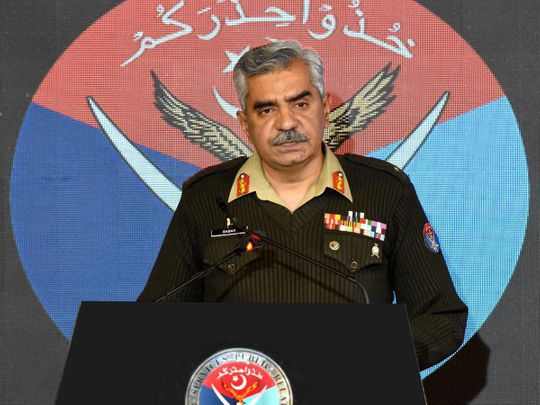
Islamabad: Pakistan armed forces spokesperson in his press briefing on Wednesday shared last year’s military successes in dismantling terrorist networks, reviewed the challenging border security, and clarified that military operations are continuing against the banned militant group Tehrik-i-Taliban Pakistan (TTP).
Border fencing
Pakistan is committed to completing the border fencing as the soldiers gave blood to erect the fence to ensure peace and security in the country, said Inter-Services Public Relations (ISPR) Director General Major General Babar Iftikhar. “We cemented this fence with the blood and sweat of our martyrs,” he said. “It is a fence of peace,” and its purpose is “not to divide the people, but to protect them” as the fencing would ensure security, regulate border crossing and trade and deter militant infiltration, smuggling and illegal crossings, he said.
Describing the border situation as “challenging”, he said nearly 94 per cent of the 2,600-km Pakistan-Afghanistan border has been secured, while more than 71 per cent fencing of the Pakistan-Iran border has been completed. Pakistan has constructed nearly 1,200 border posts along the Pak-Afghan border. Responding to the incidents of Afghan Taliban soldiers removing the fence, he said there were some isolated incidents that are being amicably resolved by the governments of Pakistan and Afghanistan. “The fencing is underway and will continue.”
No ceasefire with TTP, operations to continue
During the press briefing, the DG ISPR clarified that there is currently “no ceasefire or talks” continuing with the banned TTP. The ceasefire ended on December 9, he said. Pakistan considered talks with the “violent non-state actors” at the request of the current Afghan government after Pakistan asked them to ensure that TTP should not be allowed to use Afghan soil against Pakistan.
However, currently, “There’s no ceasefire. We are fighting. We are conducting operations every day and we will continue till the time we get rid of this menace,” he vowed.
Military successes in 2021
Reviewing the recent successes, Iftikhar said that 60,000 intelligence-based operations were carried out by security forces last year under the Radd-ul-Fasaad military operation which helped dismantle dozens of terrorist networks and arrest masterminds and their facilitators. In 2021, “intelligence agencies issued 890 threat alerts which helped averted 70 per cent terror attacks.”
In Khyber Pakhtunkhwa’s tribal areas, more than 70,000 mines and unexploded ordnance were recovered which helped save many lives. However, several troops were injured and lost their lives during the de-mining operation.
A total of 248 troops were martyred in 2021 in different security operations in the mission of ridding the country of terrorism and ensuring peace. He added the army is also providing security to all development projects especially CPEC (China–Pakistan Economic Corridor).
Defence procurements
Pakistan armed forces are continuously enhancing their capacity and upgrading technology within the economic restraints and also by developing local defence industry, the general said. When asked about the latest procurements, Iftikhar revealed that Pakistan has “moved on from the Turkish deal” of 30 T129 helicopters and that the country is negotiating with the Chinese to procure gunship helicopters, which experts believe is Z-10ME.
The $1.5 billion contract with Turkey remained suspended since 2018 because of the US hesitancy to issue export licenses for the engine.
On the reported deployment of the S-400 missile system by India, the DG ISPR said: “In the last few years, Pakistan has significantly upgraded its air defence system,” making the country’s air defence system “one of the best in the world.” He also expressed concerns over the arms race in the region, saying: “Our adversary is continuously procuring latest equipment … Any conventional imbalance in this region is very dangerous … which is going to lead us into a race for procuring more equipment.”












